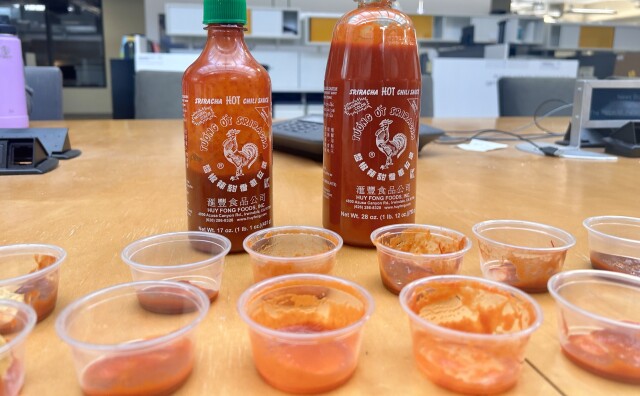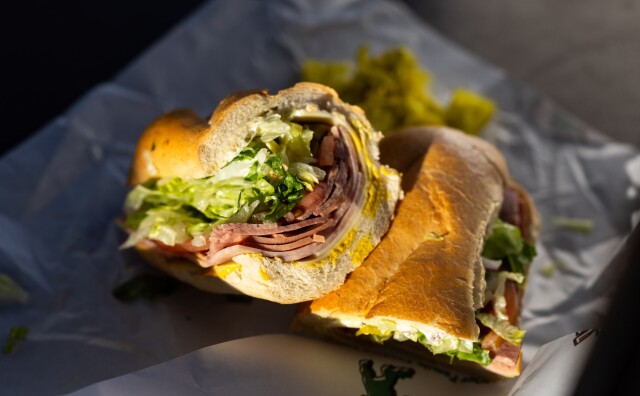Kura Sushi Will Return Its $6 Million Federal Loan After Outrage

Our news is free on LAist. To make sure you get our coverage: Sign up for our daily coronavirus newsletter. To support our non-profit public service journalism: Donate Now.
Kura Sushi USA is probably not what you'd consider a "small business."
The Irvine-based restaurant chain has 25 locations, $24 million in cash on hand, and access to $20 million more through a loan from its majority stockholder, a Japanese company.
Still, the company applied for, and received, a $5.9 million loan from a federal program for small businesses affected by the coronavirus.
Kura Sushi USA has not attracted the same ire as Shake Shack,the national restaurant chain that received, and quickly returned after public outcry, a $10 million loan from the Paycheck Protection Program.
UPDATE April 22: Kura Sushi officials said they will return the loan. In a statementCEO Jimmy Uba said:
Today, we made the decision to return our PPP loan. This was a difficult decision because our employees are extremely important to us, but it's impossible to ignore the fact that our finances allow us to weather financial hardship for a longer period than independent restaurant owners. We hope that these funds will be shared equitably among deserving candidates.
"The PPP was intended for small businesses, and to see the money going elsewhere is an insult to the mom and pops that drive our economy," said John Kabateck, the California state director of the National Federation of Independent Businesses.
According to Securities and Exchange Commission filings, at least 12 publicly-traded companies based in California received PPP loans, including multiple pharmaceutical firms, a company that rents cars to Lyft and Uber drivers, and a large auto parts distributor.

THE 'KURA EXPERIENCE'
Kura Sushi calls itself a "revolving sushi bar." Customers sit at booths next to a conveyor belt, which slowly moves portions of seared beef, garlic tuna steak and Hokkaido scallops around the room. All the food on the belt is covered by a patented plastic dome, called the "Mr. Fresh," that opens when customers reach over to grab a dish.
Kura opened its first U.S. restaurant in Irvine in 2009, and has since expanded to more than two dozen restaurants in five states. When the company went public in August 2019,investors predicted it would soon operate 300 restaurants around the country and rival chains like Olive Garden and Chili's.
But then the coronavirus pandemic hit.
CASH ON HAND
On March 18, Kura shut down all of its restaurants, according to Securities and Exchange Commission filings. Because customers come for the "Kura Experience," the company decided not to offer take-out or delivery, CEO Jimmy Uba told investors on an April 14 call,according to a transcriptpublished by the finance website The Motley Fool.
On that same call, Uba said Kura had access to a $20 million loan from its parent company, Kura Sushi Japan. But he reassured investors he hadn't borrowed any money yet, and he had no plans to do so "in the immediate future."
Why? Because Kura had "approximately $24 million in cash on hand and no debt."
Uba estimated the company was spending $1 million a week, which means it would have enough cash to stay afloat for nearly half a year.
In comparison, most restaurants have an average cash buffer of 17 days, according to Karen G. Mills, the former head of the federal Small Business Administration under President Obama and a current senior fellow at Harvard Business School.

CROWDFUNDING VS. STOCK MARKET
In addition to its ample cash, as a publicly-traded company, Kura could raise more money by issuing more stock.
NFIB's Kabateck said:
"It's outrageous that companies that know they have funding available to them are asking for this kind of money. We call upon these other publicly-traded companies that have the money available to them... to return that money."
Just 3% of California small businesses received PPP loans during the program's first round of funding.

KEEPING PEOPLE ON PAYROLL
Kura Sushi appears to be using its PPP loan for its intended purpose: paying employees.
"We want to make a best faith effort to use the funds as intended, which is keeping people on payroll," Uba, the CEO, said on the April 14 investor call.
He said the company furloughed "a modest group of support staff," but is paying the full cost of its furloughed employees' health insurance, "to support our team during this difficult time."
Kura Sushi did not respond to multiple requests for comment.
THE DATA
Despite high profile cases like Kura and Shake Shack, the majority of PPP loans appear to have gone to small businesses. According to Small Business Administration data, 74% of loans in the initial round of the program were under $150,000.
Still, larger loans sucked up more of the program's cash: loans for more than $5 million made up just 0.27% of all loans but accounted for 9% of total cash disbursed.
On Tuesday, Congress reached a deal to allocate another $320 billion for the small business loan program. This time, some $60 billion will be set aside for lenders that have better access to very small, minority-owned and rural businesses.
WE LOVE TO ANSWER YOUR QUESTIONS
-
After people began complaining online that Sriracha they'd bought recently didn't taste like the old stuff, we set out to find the answer. It didn't go well.
-
From tortas to tuna melts, all sandwiches tell a unique story as they celebrate Los Angeles' diverse tapestry of flavors with each bite.
-
The company behind Sriracha told us production has resumed.
-
Dustin Bartz has figured out a way to sell a $6 smashburger — and still make a tidy profit. He enjoys trolling competitors who charge more.
-
Two amateur bakers take on a beloved, almost sacrosanct school treasure.
-
For Jeff Alulis, the Burger Quest became “something bigger” than him.






